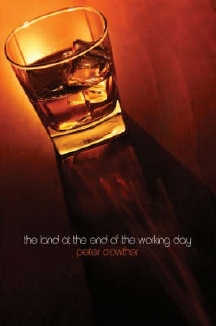 |
 Peter Crowther
Peter Crowther
The Land at the End of the Working Day
Reviewed by: Mario Guslandi © 2008
Humdrumming
UK First Edition Trade Paperback
ISBN 978-1-905532-56-8
127 pages, £25/$50
Publication Date: 04-26-2008
Date Reviewed: 06-07-2008
Index:
Horror
Science Fiction
Mystery
Fantasy
General Fiction
There is a long literary tradition of tales told by a group of friends or acquaintances, either gathered in front of a fireplace in a country mansion or sinking in comfortable armchairs within the walls of a private club. Bars as Arthur C. Clarke's 'White Hart' or L. Sprague De Camp's 'Gavagan's Bar' have been also a favorite location for people willing to trade anecdotes and yarns.
'The Land at the End of the Working Day' is a Manhattan walk-down bar where people go to meet and drink together, but also, "...a retreat from the anguish of the world, a second home where one’s sins are overlooked, where strangers may share intimacies and friendships are made, whether lasting an hour or a lifetime."
And, more than that, "...a small way-station situated at Civilization’s End, a final resting place before plunging off into who knows what, the nude sea of uncertainty that stretches, sweeping across time zones, to infinity in any direction..."
The regulars include Jim Leafman, a garbage collector whose wife is cheating on him; Edgar Nornhoevan, a big guy with serious prostate problems; Mc Coy Brewer, a man who has lost his job and faces the tragedy of unemployment, and, of course, Jack Fedogan, the friendly bartender, still grieving for his deceased beloved spouse.
Thus, like in real life, everybody has a secret pain, a hidden worry.
The bar's microcosmos, with its little jokes and its petty tragedies becomes a magnifying glass focused on the tiny ingredients which constitute everyday's life with its joys and its disappointments.
The volume collects four novelettes set in the ordinary but magic atmosphere of that Manhattan joint.
In 'Gandolph Cohen and the Land at the End of the Working Day' a mysterious stranger shows up at the bar and foretells what’s going to happen to the various customers. The piece, imbued with a deep sense of melancholy, discloses the frailty and the helplessness of the human condition but leaves behind a message of hope for everyone. The author carves the characters and portrays the place's atmosphere with skill and lyricism.
'Bernard Boyce Bennington and the American Dream' is a beautiful tale in which the bar regulars are joined by two gentlemen sharing the memory of a woman they both briefly met and desperately loved. The woman (clearly a supernatural entity) has changed their lives forever but is nowhere to be found in the labyrinth of New York streets. A gloomy, perfect story of lost love and loneliness, the tale comes to a tragic ending when one of the two men in order to pursue his dream bursts into the street following a trace of the woman he’s longing for.
The other guy will try as well to reach the woman "(He wants what we all want. A little companionship to keep out the cold)." In the bar things resume their usual routine for the clients, "...prolonging their dream and putting off that dreadful moment when they, like all of us, must be alone again..."
In 'Front-Page McGuffin and the Greatest Story Never Told', a retired newspaper reappears at the bar after a long absence and turns out to be dead, even if his body, unable to let go, is still sticking around. Only the efforts of the sympathetic bartender and the man's desire to get reunited with his late wife will finally make him depart from this side of the grave.
Again, a touching piece of fiction, describing with taste and gentleness the pain of losing a loved one.
The final novelette, 'Cliff Rhodes and the Most Important Journey 'describes how two non-regulars hit the bar and get involved in the general storytelling, such as the tale of a retarded boy riding a bus year after year, blended with the report of the final days of the mother of one of the regulars.
Reference is made to Jules Verne’s 'A Journey to the Center of the Earth' and it appears that the fictional events may be true, involving no less than the actual location of the bar itself.
Without giving away too much, it is sufficient to say that the story develops as a meditation on the value of adventure — either real or imaginary- as a tool for breaking the limits and the monotony of human existence.
A smart editor and a successful publisher (his PS Publishing has repeatedly won the British Fantasy Society award for best small press) Peter Crowther with this excellent collection reminds us that, first of all he’s a terrific writer moving effortlessly across the various subgenres of dark fantasy, always providing evidence that what makes good fiction is the ability to tell in the right words what we feel about the mysteries of human life ,a fleeting light in the dark of an immense universe.
|
 |
